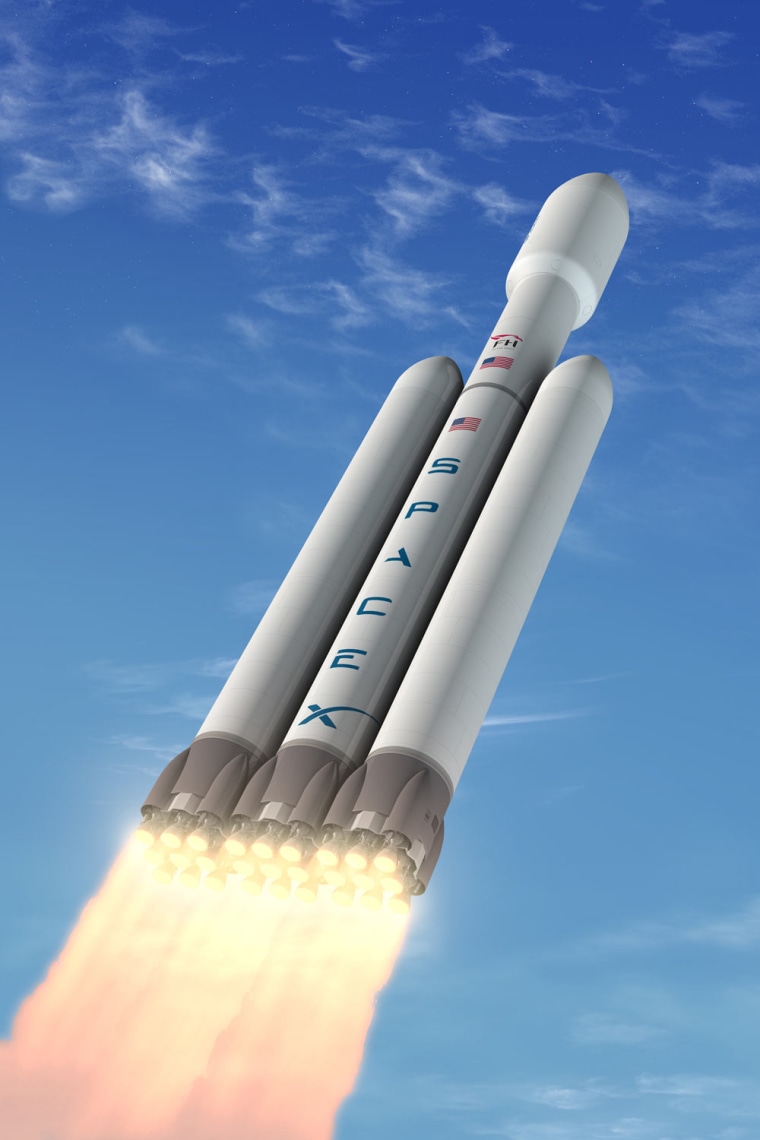The private spaceflight company SpaceX has signed its first launch customer for its new mega-rocket, the Falcon Heavy, even as the firm's first commercial spaceship prepares to return home from the International Space Station.
The Hawthorne, Calif.-based SpaceX announced Thursday that it has landed a contract with satellite communications provider Intelsat to launch a satellite using the new Falcon Heavy rocket, which is expected to become the world's most powerful rocket in use when it starts flying.
"SpaceX is very proud to have the confidence of Intelsat, a leader in the satellite communication services industry," SpaceX CEO and rocket chief designer Elon Musk said in a statement. "The Falcon Heavy has more than twice the power of the next largest rocket in the world. With this new vehicle, SpaceX launch systems now cover the entire spectrum of the launch needs for commercial, civil and national security customers."
SpaceX's Falcon Heavy rocket is an evolution of the company's successful Falcon 9 rocket, which was used to launch the firm's unmanned Dragon capsule on its maiden voyage to the International Space Station last week. But instead of a single Falcon 9 rocket, the Falcon Heavy will feature a central core stage with the equivalent of two Falcon 9 rocket first stages strapped to its sides. [How SpaceX's Falcon Heavy Rocket Will Launch (Video)]
The Falcon Heavy rocket will stand 227 feet (69.2 meters) tall and weigh about 3.1 million pounds (1.4 million kilograms). It will be capable of launching about 117,000 pounds (53,000 kilograms) of payload into orbit — twice the payload capacity of NASA's space shuttle, company officials have said.
The new rocket will be able to launch twice as much material as the most powerful rocket currently in use — the Delta 4 Heavy operated by the United Launch Alliance. Only NASA's Saturn V moon rockets, which launched astronauts to the moon during the Apollo lunar missions, could carry more weight into orbit, SpaceX officials have said.
Musk has said that the first test flight of a Falcon Heavy rocket could occur as early as 2013. The rocket is expected to liftoff from a new launch pad SpaceX is building at Vandenberg Air Force Base in California.
SpaceX's announcement that it has signed Intelsat on as a Falcon Heavy customer did not list a targeted time for the planned launch, or the total sale for the flight. SpaceX officials, however, have said in the past that Falcon Heavy launches will cost about $100 million per mission, twice that of its commercial Falcon 9 flights.
Under the Intelsat agreement, SpaceX agrees to launch an Intelsat into a so-called geosynchronous transfer orbit, a flight path that will deploy the satellite in an orbit that will allow it to reach a final geostationary orbit about 22,300 miles (35,900 kilometers) above the equator.
"Intelsat has exacting technical standards and requirements for proven flight heritage for our satellite launches," said Intelsat CTO Thierry Guillemin. "We will work closely with SpaceX as the Falcon Heavy completes rigorous flight tests prior to our future launch requirements."
You can follow Space.com Managing Editor Tariq Malik on Twitter . Follow Space.com for the latest in space science and exploration news on Twitter and on .
